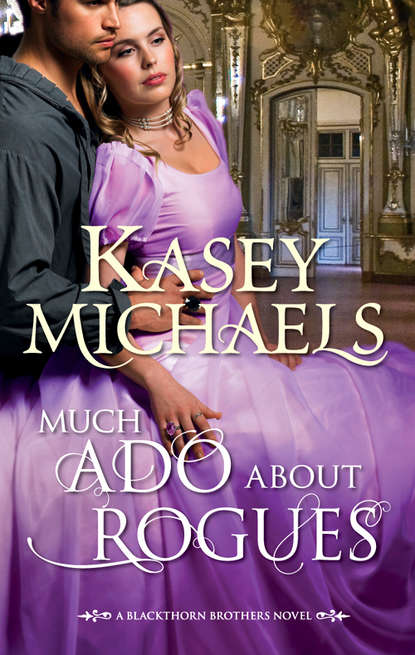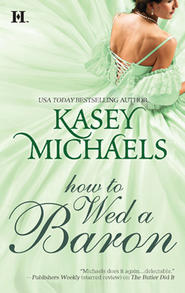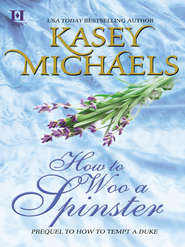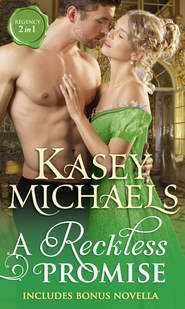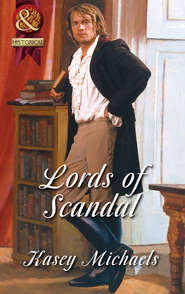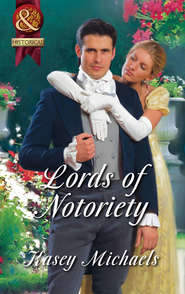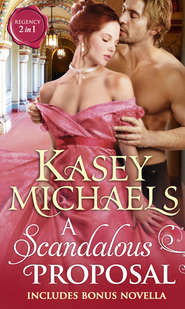По всем вопросам обращайтесь на: info@litportal.ru
(©) 2003-2024.
✖
Much Ado About Rogues
Автор
Год написания книги
2018
Настройки чтения
Размер шрифта
Высота строк
Поля
He handed Tess the brace of candles and opened the glass doors of the cabinet holding the few pitiful ancient relics the marquis kept on display; the collection of a man who couldn’t afford to indulge his love the way he had years ago, in France. Or so it would seem to the world. The Marquis de Fontaine had never shown his real face to the world.
Jack had heard the story only a few weeks before René died. He’d found Sinjon in his study after midnight one night, sloppily drunk and embarrassingly maudlin on what he said was the twentieth anniversary of the death of his wife. He’d been both intrigued and flattered when the man motioned him to a chair and began to speak—and, in the end, he was appalled.
He doubted Tess and René had ever been privy to what had really happened, who their father was and had been, why their mother had died, what had brought them to England, what drove Sinjon to offer his services to the Crown against France.
The Marquis de Fontaine was a man of varied background and myriad talents. He’d prided himself on his knowledge of Greek, Roman and Egyptian antiquities; indeed, he’d devoted the first nearly fifty years of his life to amassing his collection, traveling the continent in order to add to it. Until he’d met his Marie Louise. He’d been amazed at the birth of the twins, slightly bemused as to what the fuss was all about, but they seemed to please Marie Louise, and he was free to go back to what he called his studies.
And his other pursuits.
Then came 1797, and suddenly Sinjon, whose facile use of a loyalty that seemed to bend with the prevailing wind had miraculously kept him safe in Lyon, was faced with the possible loss of his way of life. The worst of the Terror might be behind them, but the Revolutionary Army was becoming too powerful, thanks to the success of General Louis Hoche and some upstart Corsican named Bonaparte. Of the three, the Directorie, Hoche and Bonaparte, he feared the Corsican most, recognizing a lean and hungry ambition when he encountered it. Sinjon began working in secret with other Royalists to bring back the Ancien Régime and all the privileges of rank that went with it before it was too late for any of them.
But it had already been too late. He should have seen the signs, made a decision as to what was most important to him, and taken his wife and children to safety. Instead, he and his band of compatriots goaded and pushed the Directorie at every turn. Employing a plan devised by Sinjon, they nearly succeeded in an attempt to assassinate several of its leaders.
And that, to Sinjon, had been his single biggest mistake. The Directorie retaliated with all the might still at its disposal, hunting down and disseminating their opposition. While Sinjon and his men hid in cellars, not knowing what was happening, his adored Marie Louise had become one of the casualties of his folly.
He’d cried then, great blubbering drunken sobs. Jack sat silent, as there were no words that could comfort the man, heal his guilt and his loss. At that moment, no matter what Sinjon asked of him, Jack would do it. Because he was looking at a beaten old man who had lost everything; his wife, his country, his fortune. Here in England he lived in genteel poverty in a run-down manor house, employed by the Crown but never quite trusted.
Genteel poverty. Forced to plot and often kill, not only to exact justice for all he’d lost and rid the world of that upstart Bonaparte, but also to save a prime minister from scandal, find a way to disgrace those whose voices in Parliament didn’t agree with the Crown, employ his skills to clean up the many messes those in power made with regularity. He’d no choice.
Except that he did. He’d always had a choice. The man had been grieving? How much? Drowning his guilt and sorrows? Really? Jack knew he’d never know exactly where Sinjon’s clever mix of truth and fiction had merged that night, but only the reality of what he had seen. He had been the man’s audience, drawn in, made sympathetic to a supposedly sad and disillusioned wreck of a man. What had come next, his introduction to the second secret room, to the marquis’s secret life, would forever color his opinion of his mentor.
Now he would show Tess her real father, the damning part of the man that could readily be seen. A dose of truth couldn’t hurt her any more than the fiction she’d built up around the man, the fiction Sinjon had so cleverly encouraged.
“Give me the candles, Tess, and follow me,” Jack said, and then led the way down the steps and across the room to the stone he’d located earlier.
“There’s more to see?” Tess asked as he pushed on the stone and it pivoted easily.
Jack held the brace of candles at shoulder level as the cabinet holding Sinjon’s inspired arsenal slid aside. “Look at what’s there, Tess, and at what isn’t. As one important piece is missing.”
He stood back and allowed her to walk into the small chamber lined with shelves from floor to low ceiling on three sides. The only furniture in the room was a single chair placed directly in its center; where Sinjon would sit to admire his genius.
“To your left, the Greek. To your right, the Roman. Straight ahead, and most interesting of all for what isn’t there, the Egyptian. Your father’s treasures. Or should I say, your competition. What Sinjon loves most in this world. What he risked his family for, lost his wife for, sacrificed his children’s childhoods for, I suppose some may think. I know I do.”
Tess turned in a slow circle, the candlelight casting strange shadows on the rows and rows of artifacts, shining back to her from Roman shields and breastplates, dancing along gem-encrusted bowls, illuminating ancient busts, helmets, bracelets, necklaces… and reflected in the tears in her eyes.
Selling only a few small pieces would have provided more than enough to pay the village shopkeepers, repair the manor house, educate his son at the best schools in England, purchase a mansion in Mayfair, launch his daughter into Society.
If Sinjon could part with any of his treasures. If selling them on the open market wouldn’t mean the end of him.
“I don’t… I can’t… How, Jack? Why?”
“Let’s go back upstairs,” Jack said, taking the brace of candles from her and leading the way, holding on to her hand as they went. Her suddenly very cold hand.
He poured her a glass of wine and took it to her as she sat with exaggerated erectness on the leather couch, staring at nothing. She shook her head slightly in refusal so he downed it himself, and then positioned himself at the front of the desk, resting against its edge.
Jack would have spared her this if he could, but she’d made it impossible. Sinjon had made it impossible. The man she so admired, so longed to please, her so wonderful, perfect and heroic father. He wondered how long it would take her to understand the implications of what she’d just seen.
It didn’t take half as long as he’d thought. She’d always been very bright.
“He’s a thief, isn’t he?” she said finally. “My father is a thief.”
“I made that mistake myself, and was quickly corrected. He sees himself more as a private collector. A thief, you see, steals for profit. Sinjon was always most discerning, taking only the best and keeping it for his own private enjoyment. Your competition, Tess, the true loves of his life.”
Tess bent her head and began rubbing hard at her temples. “God. Oh, sweet Jesus…”
Jack pushed himself away from the desk and sat down beside her, taking her hands in his and lowering them to her lap, not letting them go. “It was easy in France,” he told her. “He had his title to protect him. Nobody suspected that the treasures he brought home with him from his travels were anything but the purchases of a wealthy man. He could display many of them openly, keeping only the most easily recognizable safely hidden away, where he could appreciate them. He was admired, sought after to speak about antiquities. An acknowledged expert, the so-fascinating Marquis de Fontaine. Nobody knew, Tess, not even your mother. That’s what he was trying to protect when he sided with the other Royalists. His way of life. His treasures. In the end, the new French government got most of them, so he came here, and started over.”
“Started over…” she repeated softly. “But… but he was working with the Crown.”
“What better excuse to travel where he wanted, make use of secret channels of transportation, have access to ships, to the plans of the mansions of the wealthy, museums… palaces. There was a war going on, treasures were disappearing everywhere, for many reasons. Some say Bonaparte brought half of Egypt back to France with him. I think Sinjon hated him most for that, and that the Emperor had the treasures and he didn’t. But your father also did his job, Tess, and very well, to give the man the credit due him. And then, when the mission was complete, he’d reward himself by adding to his collection. But Sinjon isn’t a young man anymore. He could still choose the prize, formulate the plans, but it soon became apparent to him that he needed someone else to execute them.”
Tess had been breathing rapidly, but now she took a deep, openmouthed breath that was nearly a gasp. She was attempting to get herself under control. “René?” she asked at last. “Did he…?”
“I don’t think he knew, no. In any case, he hadn’t proved as talented as Sinjon had hoped. You, however, exceeded his expectations, and he’d every intention of introducing you to that room down there. Until I came along. You want praise from the man, Tess? I’ll tell you something he told me. You should have been born the son.”
Tess smiled ruefully. “How very like him. Every compliment has a hook on the end, one that digs straight into the flesh. Praise for me, at the expense of my brother. We were in a competition, weren’t we? One of my father’s deliberate making. The winner gets to collect for him. I think I’m going to be sick.” But then she rallied, as another question struck her. “Did you… did you steal with him?”
Tess knew what he’d done before coming to the manor house. How he’d played at cards, played at highwayman, played at most anything, running wild and angry, always searching for something, never knowing what that something was. Never knowing if he was running toward something, or away from himself. The bastard who belonged nowhere.
Sinjon must have thought the gods had personally delivered Jack Blackthorn to him.
Jack shook his head. “He said I wasn’t quite ready, and that robbing a few coaches for a lark wasn’t the same as what he needed from me. He said I’d never experienced joy of the sort I’d know when the prize was much more than some silly matron’s gaudy diamond necklace. The prize was one thing, and worth any danger, but the joy of the acquisition itself, knowing what you had in your hand was now yours and yours alone, was worth more than anything else. But first I had to learn a few rudimentary things about antiquities, gain an appreciation for them so that I’d treat them with the care they deserved as I was… acquiring them.”
He’d told her most of it now, but there was more. “I thought I’d found a home, Tess, a real purpose in government service. Sinjon had saved me from myself, and you’d given me a reason to believe I didn’t have to be alone. Once he’d told me his secret, I knew my duty was to turn Sinjon over to the Crown. Yet how could I do that, knowing it would destroy you and René? Selfishly, I put off making my decision until we’d completed the Whitechapel mission. I shouldn’t have waited, and I’ll never forgive myself for that.”
“Whitechapel. Where René died. And I sent you away anyway. But you never reported Papa to the Crown. Why?”
“Sinjon was already seventy or more, or at least that’s the most he would admit to—definitely past climbing through windows or outrunning any pursuit. Without me, or someone like me, his collecting days were over. He’d lost. He’d lost his youth, his son and, when I walked away, his last chance at revenge. Because of you, I promised him I wouldn’t turn him over to the Crown, but that if he went back to his old ways I wouldn’t be held to that promise. And if he tried to recruit you, I’d know, and I’d kill him. He knew I meant what I said.”
“And he believed you,” Tess said quietly. “I would have.”
“He was a broken man when I left, Tess. I’d like to think the errors of his ways, and what those errors had cost him, had finally come home to him. Instead, the need for revenge must have been eating at him ever since.”
Tess shook her head. “Revenge? You mean on France, for what happened to my mother. But that was all so long ago.”
And here it was, the moment he’d been dreading more than any of the others. He’d never wanted her to know this particular truth.
“No, Tess. What I’m speaking of now has nothing to do with France or the war or any attempt to restore the monarchy. I doubt it ever was really about any of that, not for Sinjon. It was always about enlarging his collection. And remember this—he was already more than fifty years old when he came to England. I wasn’t the first pupil he trained to do his bidding. There was another, before me. An exceedingly apt and eager pupil, and quite ambitious. They worked together for years. Until the student, who saw profit where Sinjon saw beauty, eventually betrayed the mentor, striking out on his own, hiring out his unique talents for most any venture, any government, and taking his own rewards. You don’t know him, Tess, although you may have seen him here years ago. But you have seen his calling card. I’ve been hunting him for four years, ever since Sinjon told me exactly who he is.”
Her eyes were wide and shocked when she turned toward him on the couch. “The Gypsy. That’s who you mean, don’t you? The Gypsy. The man who murdered René. Papa trained him? And now he’s gone after him…”
CHAPTER FOUR
TESS SPENT THE next few hours alternately crying and cursing, pacing her bedchamber in her old nightrail and dressing gown, flinging herself into the chair in front of the fire, collapsing to her knees in the center of the room, wrapping her arms tight around herself, rocking in her grief and pain.
Jack had told her all of it. She’d pushed him until she’d heard it all.
A lie. Her father’s life was a lie; everything she’d thought about him, believed about him, was a lie. Her life was a lie. René’s death had been for a lie, and her mother’s, as well. For greed. For things.





